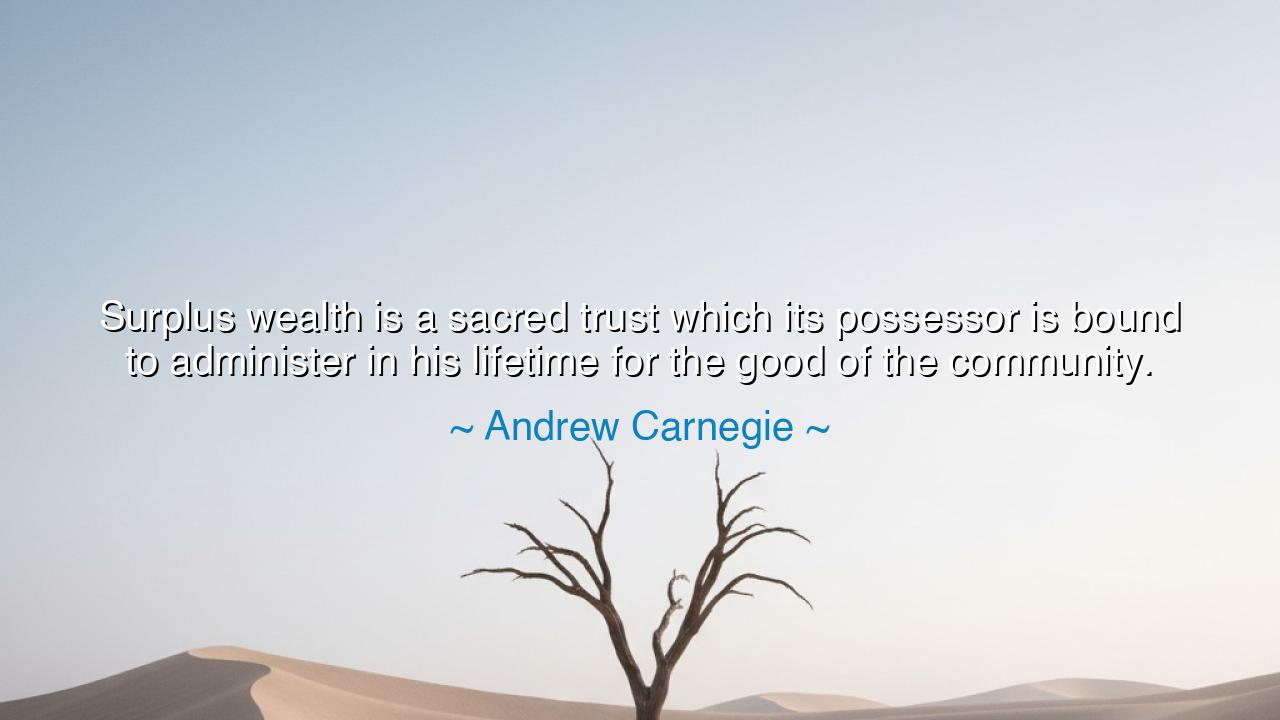
Surplus wealth is a sacred trust which its possessor is bound to
Surplus wealth is a sacred trust which its possessor is bound to administer in his lifetime for the good of the community.






Hear the mighty words of Andrew Carnegie, the titan of industry who rose from poverty to become one of the wealthiest men of his age: “Surplus wealth is a sacred trust which its possessor is bound to administer in his lifetime for the good of the community.” In this proclamation, he casts aside the notion that riches are a private treasure to be hoarded, declaring instead that they are a solemn responsibility. For wealth, in Carnegie’s eyes, was never meant to be an idol for the few, but a tool to uplift the many.
The meaning of this saying is both moral and practical. Surplus wealth—that which exceeds the needs of its possessor—carries with it a duty. To hoard it is selfish, to squander it is folly, but to use it for the good of the community is noble. It is not the amassing of fortune that defines greatness, but the wise and just distribution of it while life remains. Deathbed charities, Carnegie warned, are too late; the true calling is to use one’s abundance actively, to build schools, libraries, hospitals, and foundations that strengthen society. Thus, wealth becomes not a curse, but a blessing—when guided by purpose.
The origin of this philosophy is found in Carnegie’s famous essay, The Gospel of Wealth, written in 1889. In an age of vast inequality, when industrial barons commanded empires while laborers toiled in misery, Carnegie sought to give moral vision to the possession of riches. He declared that the wealthy man must live modestly, provide for his family, but devote the rest to the uplift of his fellow men. This was not mere theory—he practiced it. By the end of his life, he had given away over $350 million, building thousands of libraries, universities, and cultural institutions, believing that knowledge and opportunity were the greatest gifts one could bestow.
History offers many mirrors to this truth. Consider the great emperor Ashoka of India, who after years of conquest turned from war to welfare. He declared his wealth and power a trust to be used for the betterment of his people. Hospitals were built, roads laid, justice administered with mercy. His reign became remembered not for bloodshed, but for compassion. In the same way, Carnegie’s vision was that the legacy of the rich should be measured not by what they consumed, but by what they contributed to the community.
And yet, the opposite has also scarred history. Many rulers and magnates clung to their fortunes with greedy hands, leaving behind monuments to themselves but no blessings for their people. Their palaces crumble, their names forgotten, their wealth scattered like dust. For when riches are seen only as personal treasure, they rot both the heart of the possessor and the soul of the nation. Truly, surplus wealth without stewardship is like stagnant water—breeding corruption instead of life.
The lesson for us, beloved listener, is this: whether you hold great fortunes or modest means, treat what you possess as a sacred trust. Ask not only what your wealth can buy, but what it can build. Even if your treasure is small, you can use it to nourish others—to educate, to feed, to heal, to inspire. To give in life is to live with purpose. To wait until the grave is to give too late.
Therefore, in your daily walk, let Carnegie’s wisdom guide you. Live modestly. Provide for your family. But let your abundance—whether coins, skills, or time—flow into the community. Support the young in their learning, aid the sick in their need, lift the weary with kindness. In doing so, you fulfill the sacred law that wealth is not possession, but stewardship.
So remember always: “Surplus wealth is a sacred trust.” Use what you have for the good of others, and your legacy will not be measured in gold, but in lives uplifted, communities strengthened, and hope rekindled. For riches perish, but the fruit of generosity endures forever.






PTPhuong Tong
I love the idea of wealth being a sacred trust. However, I wonder if this view has evolved over time. With the growing wealth inequality in the world today, should people with surplus wealth be more actively involved in creating systemic change? Carnegie’s vision seems more about individual charity, but does that approach truly solve the problems of poverty and inequality in today’s society? How do we move from individual giving to structural solutions?
DDangKhieuMy
Carnegie’s perspective on surplus wealth is inspiring but also raises questions about the practicality of it. How do we ensure that wealth is being used for the good of the community in a way that benefits everyone equally? There’s a fine line between charitable giving and control over how money is spent. What does it truly mean to administer wealth for the community’s good—does that include government regulations or purely voluntary action?
MHPham My Ha
This quote really challenges the conventional notion of wealth. Carnegie’s idea that surplus wealth is a trust to be used for community benefit makes me think: do the wealthy today see it that way, or is the focus more on individual gain? It raises questions about how wealth is accumulated and the ethical responsibility that comes with it. How do we balance personal prosperity with social responsibility?
MTKhong Minh Toan
Andrew Carnegie's view on wealth as a sacred trust is thought-provoking. It makes me wonder: if wealth is meant to benefit the community, how do we ensure it’s being distributed fairly and effectively? Should wealthy individuals be required to give back, or is philanthropy a personal choice? I like the idea of wealth being used for the greater good, but how do we measure the impact of such contributions without exploiting others?